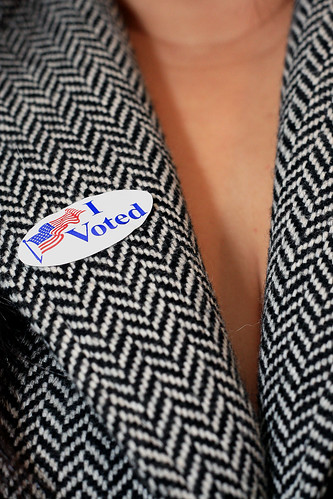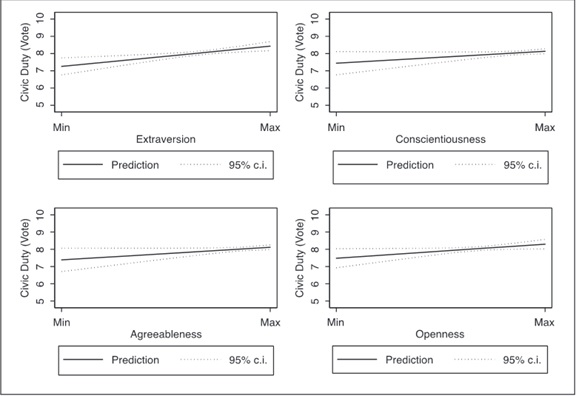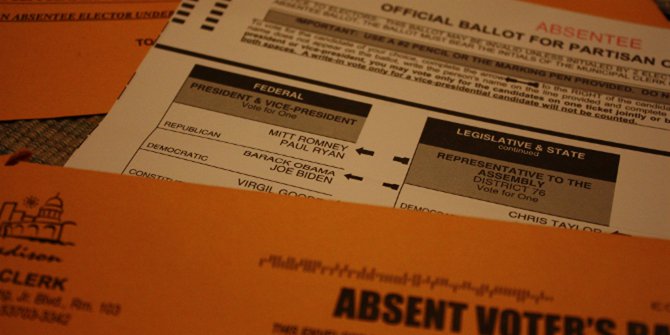 Voter turnout is a perennial concern for political scientists and politicians alike. Even with extensive campaigns to “get out the vote,” turnout for most elections lingers around half of the eligible population. Aaron C. Weinschenk examines the idea that the propensity to vote is influenced by deeply rooted personality traits that cultivate a sense of civic duty. He finds that a number of the “Big Five” personality traits, Conscientiousness, Extraversion, Agreeableness, and Openness, are positively correlated with a perceived duty to vote.
Voter turnout is a perennial concern for political scientists and politicians alike. Even with extensive campaigns to “get out the vote,” turnout for most elections lingers around half of the eligible population. Aaron C. Weinschenk examines the idea that the propensity to vote is influenced by deeply rooted personality traits that cultivate a sense of civic duty. He finds that a number of the “Big Five” personality traits, Conscientiousness, Extraversion, Agreeableness, and Openness, are positively correlated with a perceived duty to vote.
The question of why some people vote while others choose not to has long been of interest to political scientists. One of the most interesting aspects of this question surrounds the paradoxical nature of voting: the likelihood that a single vote will influence the outcome of interest is infinitesimal, so why would people choose to bear the costs of voting? One explanation that has developed as a way to resolve this paradox suggests that the decision to vote is driven, in part, by a person’s sense of civic duty, which refers to “a belief that an individual has an obligation to undertake actions that benefit others even when the actions are costly to themselves.”

From the standpoint of democratic theory, the idea that people should have a strong sense of civic duty is one that has received a great deal of attention. Indeed, in their classic work The Civic Culture, Gabriel Almond and Sidney Verba build the sense of duty into their idea of what defines a civic culture. More recently, some scholars have noted that because public participation in politics is a defining feature of democratic governance, feelings of obligation to participate in civic life should be viewed as an essential element of good citizenship. Given the importance of civic duty, it is not surprising that a vast amount of intellectual energy has been spent on the question of how to cultivate it among citizens. On an empirical level, numerous scholars have shown that the sense of civic duty has a powerful impact on outcomes of interest. For instance, the sense of civic duty is a powerful predictor of how likely an individual is to vote or participate in other political acts.
Although much research has developed on the antecedents of political attitudes and orientations, such as political efficacy, trust, ideology, and partisanship, relatively little research has explored the factors that shape the sense of civic duty. Given that the sense of duty is one of the most important determinants of political engagement, it seems reasonable to wonder where feelings of civic obligation come from. Why do some people feel a stronger sense of civic duty than others? If we know where the sense of duty comes from, we will be better equipped to figure out whether and how it can be cultivated.
Existing research on the determinants of civic duty has focused heavily on demographic and socioeconomic attributes like gender, age, income, education, and other individual factors like levels of religiosity. Recently, political scientists interested in the sources of political attitudes and orientations have taken great interest in the role of individual personality traits, or “deeply rooted differences in what people are like,” in influencing political orientations. To date, the role of personality traits in shaping the sense of civic duty has not received much attention. It seems reasonable, though, to think that personality attributes would form prior to political orientations like the sense of civic duty, since they develop fairly early in life and are quite stable even at a young age.
In order to investigate whether personality traits were related to feelings of civic duty, I used data from a nationally representative survey that contained measures of the sense of civic duty and respondent personality traits. To measure feelings of civic obligation, I used a question that asked respondents to rate how much of an obligation they felt to vote in elections. To measure personality traits, I used the Big Five personality traits—Openness, Conscientiousness, Extraversion, Agreeableness, and Neuroticism. Psychology research has noted that “most individual differences in human personality can be classified into five broad, empirically derived domains.”
My research revealed that a number of personality traits have important effects on the sense of duty to vote. For instance, those with high scores on the Conscientiousness trait feel a stronger sense of civic duty than those with low scores. Conscientious people tend to abide by norms and rules, so the positive relationship between this component of personality and the sense of duty makes a great deal of sense. I also found that those who had high scores on the Agreeableness trait had a stronger sense of civic duty than their counterparts. This makes sense because Agreeable people tend to have a communal and prosocial orientation. Interestingly, I found that Extraversion had a positive and statistically significant effect on feelings of civic duty. The positive influence of Extraversion on civic duty is consistent with previous research linking shyness, one component of the Extraversion trait, to civic duty. One possible reason for the positive relationship is that those who are “less integrated into their social milieu” are “less exposed to social pressure for fulfilling one’s civic duty.” The Openness trait also had a positive and statistically significant effect on feelings of obligation. People with high scores on Openness tend to enjoy cognitive stimulation and may appreciate the debate that is inherent in politics. The effects of each of the above-mentioned traits are shown in Figure 1 below.
Figure One – Effects of Personality on a Sense of Civic Duty
It is important to note that the relationships I identified between personality traits and feelings of civic duty hold even in the presence of demographic and socioeconomic controls, including age, race, gender, education, income, and religious attendance. In fact, the effects of personality traits rival and, in some cases, exceed the influence of variables that have previously been used to explain the sense of duty, including income. In addition, the results are similar when a different measure of civic duty—obligation to be informed about public issues—is used as the dependent variable. It is worth noting that Openness is a particularly strong predictor of feelings of obligation to be informed about politics, something that fits very nicely with recent research on personality and political interest.
Overall, my research indicates that personality traits, which are present early on in life and stable over time, have an impact on feelings of civic duty. Initially, one might interpret this finding to mean that interventions aimed at boosting feelings of civic obligation are unlikely to be effective, since feelings of duty are so deeply rooted within people. I would argue against such an interpretation. While personality is certainly difficult to change, knowing what a person’s personality traits are may be particularly helpful when designing interventions aimed at boosting feelings of civic duty. For instance, certain messages aimed at increasing feelings of obligation may be very effective for people with high scores on a given personality dimension but ineffective for people with low scores. Similarly, service-learning opportunities may be effective at enhancing feelings of civic duty among people with certain personality traits but may actually diminish feelings of civic duty for people with other personality attributes. Finally, knowing the types of people whose personality attributes predispose them to feel a weak sense of civic duty may help researchers target those individuals who are most likely to benefit from interventions aimed at increasing feelings of duty. Since feelings of civic duty are such an important component of public life, it is important that scholars continue to try to understand where the sense of duty comes from.
This post is based on the article “Personality Traits and the Sense of Civic Duty,” which appears in American Politics Research.
Please read our comments policy before commenting.
Note: This article gives the views of the authors, and not the position of USApp– American Politics and Policy, nor of the London School of Economics.
Shortened URL for this post: bit.ly/1iPG66N
_________________________________
 Aaron Weinschenk – University of Wisconsin, Green Bay
Aaron Weinschenk – University of Wisconsin, Green Bay
Aaron Weinschenk is an Assistant Professor of Political Science at the University of Wisconsin, Green Bay. His research interests included political campaigns, political participation, local elections, and political psychology.








1 Comments